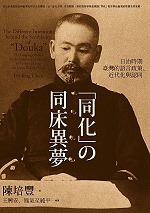 While browsing at Eslite the other day I happened across a new book that sounds interesting: Tónghuà de tóngchuángyìmèng: Rìběn zhì shíqī Táiwān de yǔyán zhèngcè, jìndài huà yǔ rèntóng (同化的同床異夢: 日治時期臺灣的語言政策、近代化與認同), by Chen Pei-feng (Chén Péi-fēng / 陳培豐).
While browsing at Eslite the other day I happened across a new book that sounds interesting: Tónghuà de tóngchuángyìmèng: Rìběn zhì shíqī Táiwān de yǔyán zhèngcè, jìndài huà yǔ rèntóng (同化的同床異夢: 日治時期臺灣的語言政策、近代化與認同), by Chen Pei-feng (Chén Péi-fēng / 陳培豐).
Although the book is written in Mandarin and has essentially no English, it has a strange but intriguing English title: The Different Intentions Behind the Semblance of “Douka”: The Language Policy, Modernization, and Identity in Taiwan during the Japan-Ruling Period. This doesn’t quite match the Mandarin.
I’d be interested in hearing from anyone who has read this.

Haven’t read it, but the Japanese title is apparently 「同化」の同床異夢—日本統治下台湾の国語教育史再考, which doesn’t quite match the English either. Roughly translates as “The Different Intentions Behind ‘Douka’: Reconsidering the History of National Language Education in Taiwan During the Japan-Ruling Period.” (using as much of their preferred English phrasing as possible.)
It is not unusual in Japan though for the alternative English title of an academic work to have more, or less, specific information than the Japanese one. Sometimes it’s to explain implications that wouldn’t be obvious to a non-Japanese reader, and sometimes I think it’s just tinkering.
(For those to whom it isn’t obvious, “douka” is the Japanese pronunciation of 同化 which means “assimilation”. Presumably it has been left untranslated because the word is well known to and generally used by specialists when referring to the specific case of Japan’s policies in Taiwan?)